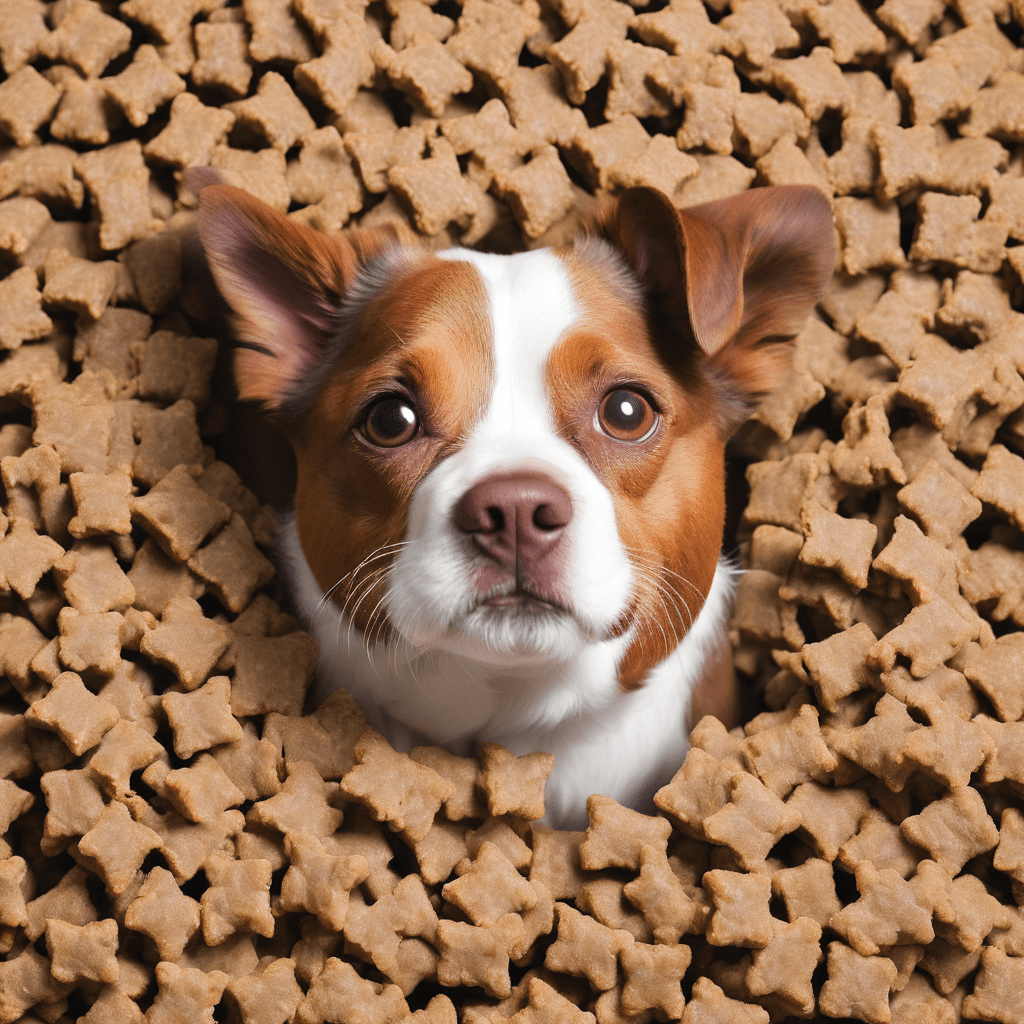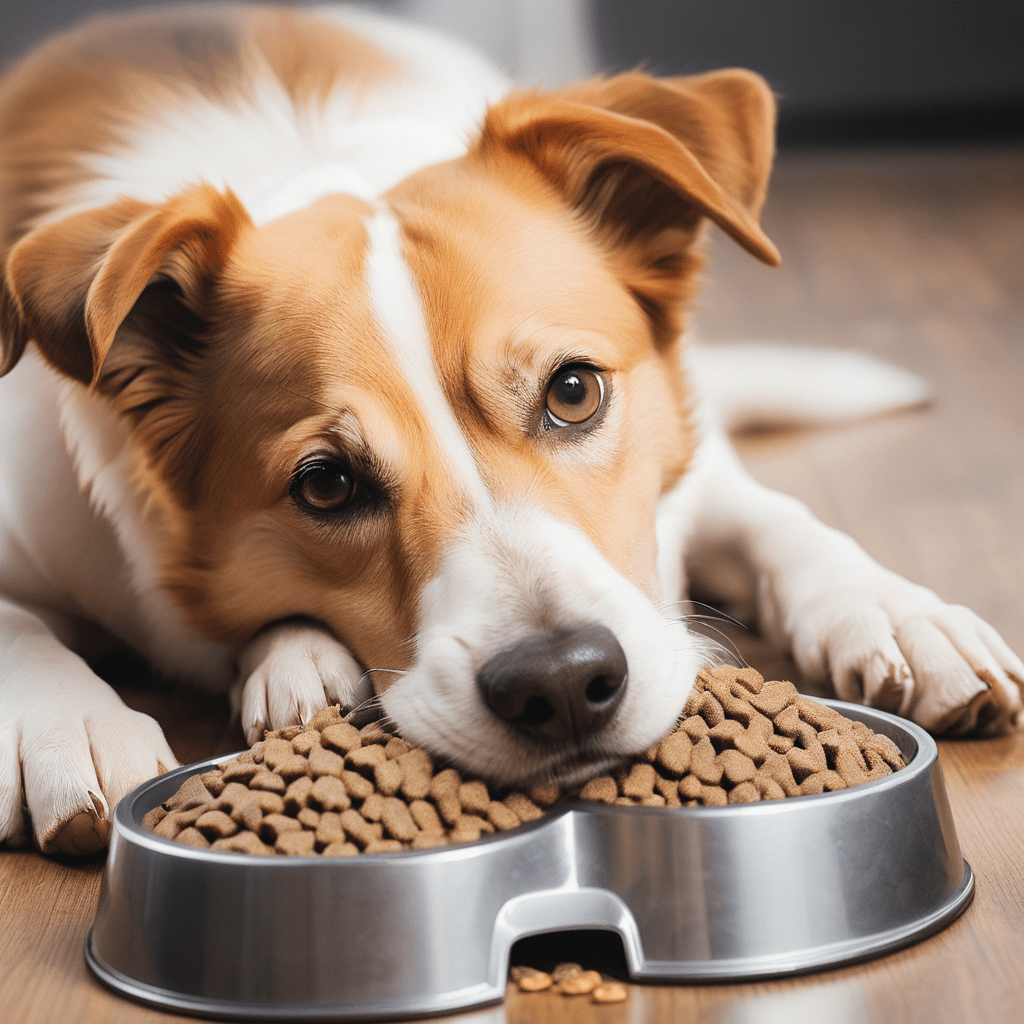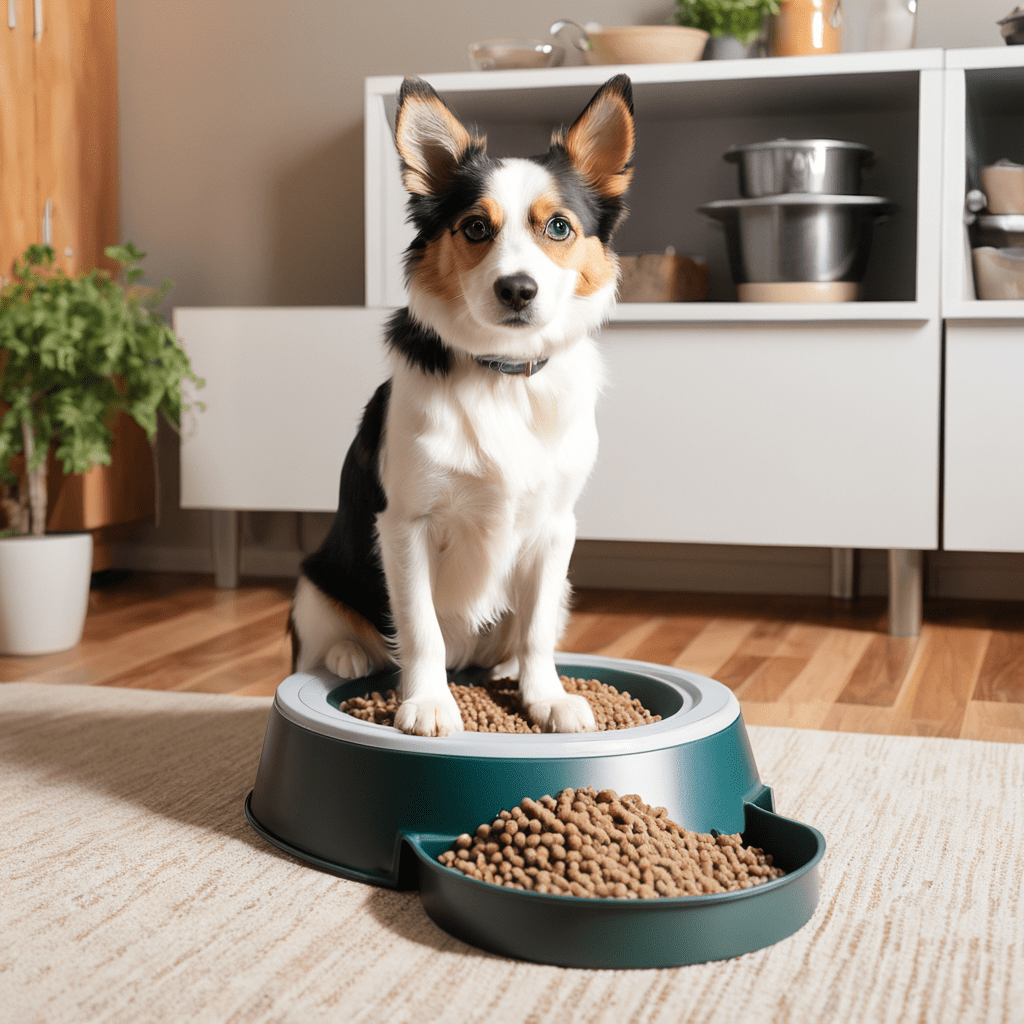Best kibble for dog with sensitive stomachs when it comes to our furry companions, ensuring they have the best nutrition is paramount. Yet, there’s a prevalent misconception that all dog food is created equal, especially when it comes to addressing sensitive stomach issues. Let’s break this myth right from the start.
Not all kibble is suitable for dogs with sensitive stomachs, and finding the right one can make a world of difference in their health and happiness.
Understanding Sensitive Stomachs in Dogs
Our canine friends can be just as sensitive to their food as we are. A sensitive stomach in dogs isn’t uncommon and can manifest in various ways.
From frequent bouts of diarrhea to persistent vomiting or flatulence, these signs can indicate that your furry friend is struggling with digestive distress. It’s crucial to recognize these symptoms early on to address the issue effectively.
When it comes to selecting the appropriate kibble for dogs with sensitive stomachs, there are several essential factors to consider. Firstly, ingredients play a pivotal role.
Opting for kibble made with hypoallergenic and easily digestible ingredients can significantly alleviate digestive discomfort. Look for formulas free from common allergens such as grains, artificial additives, and fillers.
Additionally, nutritional content is key. Dogs with sensitive stomachs may benefit from a kibble that’s low in fat and high in fiber. This combination can help regulate digestion and promote gastrointestinal health.
Furthermore, consider the formulation of the kibble. Some dogs may fare better with limited ingredient formulas, while others may require specialized options designed specifically for sensitive stomachs.

Factors to Consider When Choosing Kibble for Dogs with Sensitive Stomachs
Now that we’ve established the significance of selecting the right kibble for dogs with sensitive stomachs, let’s delve deeper into the essential factors that should guide your decision-making process.
Ingredients
The cornerstone of any quality dog food lies in its ingredients. For dogs with sensitive stomachs, it’s crucial to opt for kibble made with high-quality, hypoallergenic ingredients. Look for formulas that feature real meat as the primary protein source, such as chicken, turkey, or salmon. Avoid kibble containing artificial additives, fillers, and common allergens like grains, soy, and corn.
grain-free dog food for sensitive stomachs, hypoallergenic dog food for sensitive stomachs
Nutritional Content
The nutritional composition of the kibble plays a pivotal role in supporting digestive health. Dogs with sensitive stomachs may benefit from a diet that’s low in fat and high in fiber. Low-fat kibble helps prevent gastrointestinal upset and pancreatitis, while fiber aids in digestion and promotes regular bowel movements.
Look for kibble formulated with easily digestible carbohydrates, such as sweet potatoes or peas, to provide sustained energy without exacerbating digestive issues.
low fat dog food for sensitive stomachs, high fiber dog food for sensitive stomachs
Formulation
Not all kibble formulations are created equal, especially when it comes to addressing sensitive stomach issues. Consider opting for limited ingredient formulas or specialized options designed specifically for dogs with sensitive stomachs.
Limited ingredient kibble minimizes the risk of triggering food sensitivities or allergies, making it easier for your furry friend to digest. Additionally, some brands offer kibble infused with probiotics or digestive enzymes to support healthy gut flora and aid in digestion.
limited ingredient dog food for sensitive stomachs, specialized dog food for sensitive stomachs
Allergen-Free Options
Food allergies and intolerances can wreak havoc on a dog’s digestive system, leading to symptoms such as itching, diarrhea, and vomiting. To mitigate these issues, opt for kibble that’s free from common allergens like grains, dairy, and artificial preservatives. Grain-free options, in particular, are favored by many dog owners seeking to eliminate potential triggers for sensitive stomachs.
However, it’s essential to consult with your veterinarian to determine the underlying cause of your dog’s sensitivity before making any dietary changes.
Grain-free and allergy-free dog food solutions for those with sensitive stomachs

Palatability and Acceptance
Even the healthiest kibble won’t benefit your dog if they refuse to eat it. When choosing kibble for a dog with a sensitive stomach, consider factors such as palatability and acceptance. Opt for brands known for producing flavorful kibble that entices even the pickiest eaters. Additionally, gradual transition and patience are key.
Introduce the new kibble slowly, mixing it with your dog’s current food to prevent gastrointestinal upset and allow them time to adjust to the new diet.
palatable dog food for sensitive stomachs, gradual transition to new dog food
Top-rated Kibble Options for Dogs with Sensitive Stomachs
Now that we’ve covered the essential factors to consider when choosing kibble for dogs with sensitive stomachs, let’s explore some of the top-rated options available on the market.
These kibbles have been carefully formulated to meet the unique dietary needs of dogs with sensitive stomachs, providing optimal nutrition without compromising on taste or quality.
Grain-Free Options
Grains such as wheat, corn, and soy are common allergens that can exacerbate digestive issues in dogs with sensitive stomachs. Grain-free kibble options eliminate these potential triggers, making them an excellent choice for dogs with food sensitivities or allergies.
Look for grain-free formulas that feature high-quality protein sources like deboned chicken, turkey, or fish, paired with wholesome fruits, vegetables, and botanicals to provide essential nutrients and antioxidants.
grain-free dog food for sensitive stomachs, hypoallergenic dog food for sensitive stomachs
Limited Ingredient Formulas
Limited ingredient kibble is specifically formulated to minimize the risk of triggering food sensitivities or allergies in dogs with sensitive stomachs. These formulas feature a short list of carefully selected ingredients, making them easier to digest and less likely to cause gastrointestinal upset.
Look for kibble made with novel protein sources such as duck, venison, or lamb, paired with easily digestible carbohydrates like sweet potatoes or peas.
limited ingredient dog food for sensitive stomachs, specialized dog food for sensitive stomachs
High-Fiber Varieties
Dogs with sensitive stomachs can benefit from kibble that’s high in fiber, as it promotes healthy digestion and regulates bowel movements. High-fiber kibble helps bulk up stools, making them easier to pass and reducing the risk of constipation or diarrhea.
Look for formulas that contain natural sources of fiber such as pumpkin, oats, or brown rice, as well as prebiotics or probiotics to support gut health and immune function.
high fiber dog food for sensitive stomachs, natural dog food for sensitive stomachs

Probiotic-Enriched Options
Probiotics are beneficial bacteria that promote a healthy balance of gut flora and aid in digestion. For dogs with sensitive stomachs, kibble enriched with probiotics can help alleviate symptoms such as gas, bloating, and diarrhea.
These formulas contain live, active cultures of beneficial bacteria, such as Lactobacillus and Bifidobacterium, that colonize the intestines and support optimal digestive function.
Look for kibble labeled as “probiotic-enriched” or “digestive health” to ensure your dog receives the benefits of probiotic supplementation.
probiotic dog food for sensitive stomachs, digestive health dog food options
Prescription-Grade Formulations
In severe cases of digestive distress, your veterinarian may recommend prescription-grade kibble formulated specifically for dogs with sensitive stomachs. These formulas are often available by prescription only and are carefully crafted to meet the unique nutritional needs of dogs with gastrointestinal issues.
Prescription-grade kibble may contain hydrolyzed proteins, which have been broken down into smaller, more easily digestible molecules, as well as specialized ingredients to support digestive health and manage symptoms such as vomiting, diarrhea, or inflammatory bowel disease.
prescription dog food for sensitive stomachs, veterinarian-recommended dog food options
Homemade and Prescription-grade Kibble Alternatives
While commercial kibble options abound, some dog owners prefer to take a more hands-on approach to their pet’s nutrition. In this section, we’ll explore homemade and prescription-grade kibble alternatives for dogs with sensitive stomachs, offering insights into their benefits and considerations.
Homemade Kibble
Homemade kibble allows you to have full control over the ingredients that go into your dog’s food, making it an attractive option for pet owners seeking to avoid potential allergens or fillers.
By using fresh, high-quality ingredients, you can tailor the recipe to suit your dog’s specific dietary needs and preferences.
best kibble for dog with sensitive stomachs Common ingredients in homemade kibble recipes include lean proteins like chicken or turkey, healthy fats such as coconut oil or salmon oil, and nutrient-rich vegetables like sweet potatoes or green beans.
However, it’s essential to consult with a veterinary nutritionist to ensure your homemade kibble meets all of your dog’s nutritional requirements and to avoid potential nutrient deficiencies.
homemade dog food for sensitive stomachs, homemade dog food recipes

Prescription-grade Kibble
In cases of severe digestive issues, your veterinarian may recommend prescription-grade kibble formulated specifically for dogs with sensitive stomachs. These specialized formulas are carefully crafted to meet the unique nutritional needs of dogs with gastrointestinal disorders, such as inflammatory bowel disease or food sensitivities.
Prescription-grade kibble may contain hydrolyzed proteins, which are broken down into smaller, more easily digestible molecules, as well as ingredients designed to soothe and support the digestive tract.
While prescription-grade kibble may be more expensive than commercial options, it can be highly effective in managing symptoms and improving your dog’s quality of life.
prescription dog food for sensitive stomachs, veterinarian-recommended dog food options
Considerations for Homemade and Prescription-grade Alternatives
Before embarking on a homemade kibble diet or transitioning to prescription-grade options, there are several important considerations to keep in mind. Firstly, homemade diets require careful planning and preparation to ensure
best kibble for dog with sensitive stomachs they provide all of the essential nutrients your dog needs to thrive.
It’s crucial to consult with a veterinary nutritionist to develop a balanced recipe tailored to your dog’s specific dietary requirements. Additionally, homemade diets may not be suitable for all dogs, particularly those with underlying health conditions or nutritional deficiencies.
considerations for homemade dog food, transitioning to prescription dog food
Consulting with Your Veterinarian
Regardless of whether you opt for homemade or prescription-grade kibble alternatives, it’s essential to consult with your veterinarian before making any dietary changes for your dog. Your vet can provide valuable guidance and recommendations based on your dog’s individual health status and dietary needs.
They can also help monitor your dog’s progress and make any necessary adjustments to ensure they’re receiving optimal nutrition and support for their sensitive stomach.
consulting with a veterinarian for dog nutrition, veterinary guidance for sensitive stomachs
Tips for Transitioning to a New Kibble
Transitioning your dog to a new kibble can be a delicate process, especially for those with sensitive stomachs. In this section, we’ll provide actionable tips to help you navigate the transition smoothly and ensure your furry friend adjusts to their new diet with minimal digestive upset. best kibble for dog with sensitive stomachs

Gradual Transition
One of the most critical aspects of transitioning to a new kibble is to do so gradually. Abrupt changes in diet can shock your dog’s digestive system and lead to gastrointestinal upset. Instead, gradually introduce the new kibble by mixing it with their current food over a period of 7-10 days.
Start with a small amount of the new kibble mixed in with the old, gradually increasing the ratio of new to old kibble each day until they’re eating only the new food.
gradual transition to new dog food, transitioning to a new diet for dogs
Monitor Your Dog’s Response
Throughout the transition process, closely monitor your dog’s response to the new kibble. Watch for symptoms of upset stomach, like diarrhea, vomiting, or a lot of gas.
If you notice any adverse reactions, slow down the transition process or consult with your veterinarian for guidance. Additionally, pay attention to their energy levels, coat condition, and overall well-being to ensure they’re thriving on their new diet.
monitoring dog’s response to new food, observing changes in dog’s health during diet transition
Patience and Consistency
Patience is key when transitioning your dog to a new kibble, especially if they have a sensitive stomach. It may take some time for them to adjust to the new diet fully.
Be patient and consistent in following the transition plan, and avoid the temptation to revert to their old food if they experience minor digestive issues. Stick to the new kibble and give your dog time to acclimate to the changes.
best kibble for dog with sensitive stomachs patience during dog food transition, consistency in new dog food introduction
Addressing Digestive Upset
If your dog experiences mild digestive upset during the transition, there are several steps you can take to alleviate their discomfort. Consider feeding smaller, more frequent meals to ease the burden on their digestive system. best kibble for dog with sensitive stomachs
You can also try adding probiotics or digestive enzymes to their diet to promote healthy gut flora and aid in digestion. However, if their symptoms persist or worsen, consult with your veterinarian for further evaluation and treatment options.
addressing digestive upset in dogs, remedies for dog’s upset stomach during diet transition
Celebrate Small Victories
As your dog successfully transitions to their new kibble, celebrate their progress and achievements along the way. Reward them with praise, treats, or extra playtime to reinforce positive behavior and encourage them to continue adapting to their new diet.
By making the transition a positive and rewarding experience, you can help set your dog up for long-term success on their new kibble.
rewarding dog during diet transition, positive reinforcement for new dog food adaptation

Conclusion
In conclusion, finding the best kibble for dogs with sensitive stomachs is a crucial step towards ensuring their overall health and well-being. By considering factors such as ingredients, nutritional content, and formulation, you can select a
kibble that meets your dog’s specific dietary needs while minimizing the risk of digestive upset.
Throughout this guide, we’ve explored various options for kibble, including grain-free formulas, limited ingredient recipes, high-fiber varieties, and prescription-grade alternatives.
best kibble for dog with sensitive stomachs Each of these options offers unique benefits and considerations, allowing you to tailor your dog’s diet to suit their individual requirements.
It’s essential to consult with your veterinarian before making any dietary changes for your dog, especially if they have underlying health conditions or sensitivities.
Your vet can provide valuable guidance and recommendations based on your dog’s specific needs, ensuring they receive optimal nutrition and support for their sensitive stomach.
As you embark on your journey to find the best kibble for your furry friend, remember to approach the transition process with patience and consistency. Gradually introduce the new kibble, monitor your dog’s response, and address any digestive upset with care and attention.
Ultimately, the goal is to provide your dog with a balanced and nutritious diet that supports their digestive health and overall well-being. With the right kibble and a little bit of love and care, you can help your dog thrive and live their best life.












